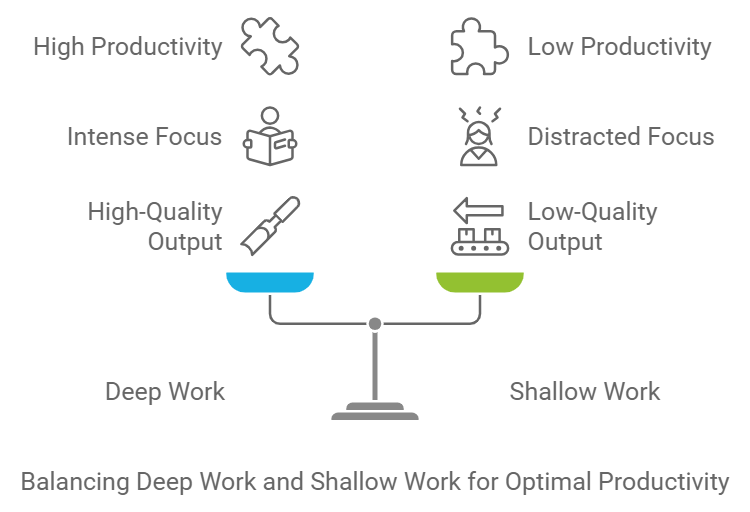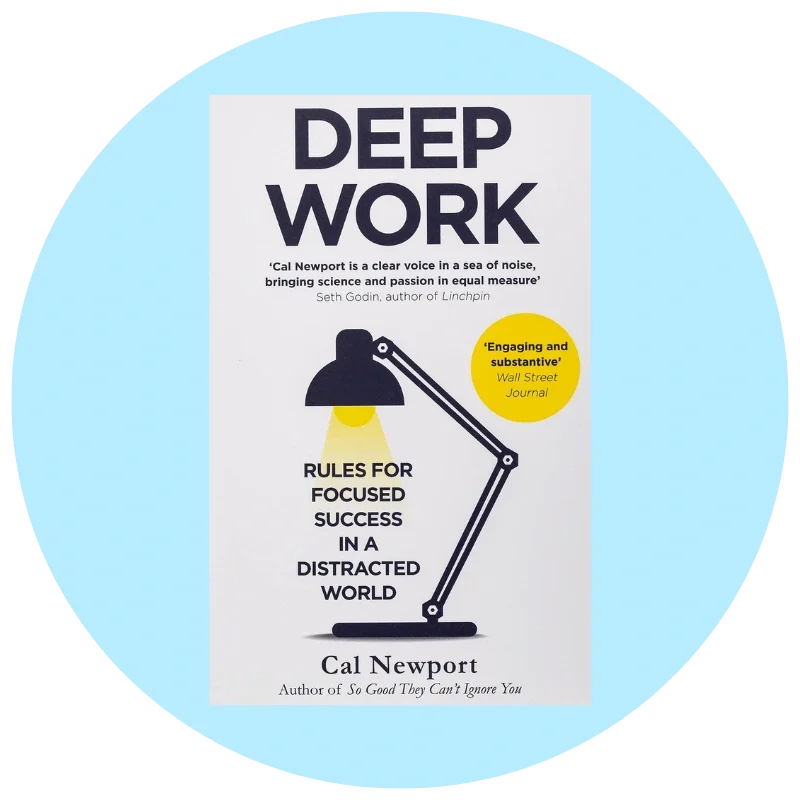11 Key Lessons I learnt from “Deep Work” by Cal Newport –

- Deep Work vs. Shallow Work
Newport differentiates between “deep work,” which is focused, cognitively demanding tasks done without distractions, and “shallow work,” which is non-cognitively demanding, often logistical tasks like emails or meetings. Deep work leads to high productivity and skill development, while shallow work offers little long-term value. Newport advocates for a disciplined approach to maximize time spent in deep work. - The Superpower of Focus in the Modern Age
In an age of constant digital distractions, the ability to concentrate deeply has become rare and thus, highly valuable. Newport argues that those who cultivate deep work habits will thrive professionally, as they can produce high-quality results quickly. He uses the example of high-achieving professionals who produce at an elite level by dedicating time to focused, undistracted work. - Law of Productivity: High-Quality Work = Time x Intensity of Focus
Newport introduces a productivity formula where the quality and quantity of work produced are directly proportional to the time spent on it and the intensity of focus. A small amount of highly focused, undistracted time is far more valuable than larger amounts of fragmented, distracted time. He emphasizes that to maximize productivity, one must train themselves to work intensely for short bursts. - The Four Disciplines of Execution (4DX)
Newport draws on the 4DX framework to implement deep work practices:- Focus on the Wildly Important: Identify what truly matters and dedicate deep work to it.
- Act on the Lead Measures: Track behaviors and habits that drive results, like hours of deep work.
- Keep a Compelling Scoreboard: Visually track your deep work hours or progress.
- Create a Cadence of Accountability: Regularly review and assess progress on your deep work goals. This framework helps sustain habits and hold oneself accountable for deep work.
- Ritualization of Deep Work Sessions
Newport suggests creating structured routines or rituals for deep work to help enter a state of focus. For example, setting a specific time and place for deep work sessions, eliminating distractions beforehand, and planning how long and what to work on all enhance the likelihood of successful deep work. This ritualization reduces the need for willpower to start working deeply and makes it automatic. - The Importance of Saying No
To maintain deep work, Newport encourages being selective about commitments and saying no to shallow, time-consuming tasks that do not align with one’s goals. He emphasizes that the willingness to say no to certain opportunities, social obligations, or distractions is crucial in protecting time and mental energy for deep work. This helps create space for focused work without interruptions. - Embrace Boredom: Training the Ability to Focus
Newport emphasizes the need to resist the urge for constant stimulation, such as checking your phone or email whenever boredom strikes. By learning to be comfortable with boredom and delaying gratification, one can enhance their ability to concentrate deeply. Newport suggests practices like scheduling time away from devices or setting periods where one is offline to build focus muscle. - The Power of the Shutdown Ritual
At the end of each workday, Newport advocates for a “shutdown ritual,” a deliberate process to close open loops and plan for the next day. This ritual signals to the brain that work is over, enabling better relaxation and ensuring the brain is ready for deep work the next day. Newport’s ritual includes reviewing tasks, setting priorities, and mentally “shutting the door” on work until the next day. - Choose the Right Philosophy of Deep Work Scheduling
Newport presents four philosophies for integrating deep work into one’s schedule:- Monastic: Eliminating or minimizing shallow obligations to maximize deep work.
- Bimodal: Dividing time into distinct periods dedicated to deep work and shallow work.
- Rhythmic: Establishing a daily habit or consistent block of time for deep work.
- Journalistic: Fitting deep work into one’s schedule whenever possible, like a journalist would. Choosing the right philosophy depends on one’s profession, lifestyle, and work environment.
- The Craftsman Mindset: Striving for Excellence
Newport advocates adopting a craftsman mindset, focusing on creating valuable work rather than seeking external rewards or validation. This mindset requires constantly improving skills, seeking feedback, and focusing on the quality of output. He shares the example of elite performers, such as musicians or athletes, who dedicate countless hours to honing their craft through deliberate practice. - Limit Social Media and Digital Tools
Newport challenges the assumption that all digital tools are inherently beneficial and suggests minimizing time on social media and apps that do not support one’s deep work goals. He introduces a “digital minimalism” approach: only use tools that significantly advance your core values or professional goals, and avoid those that distract from deep, meaningful work.
By following these principles, “Deep Work” lays out a practical roadmap for cultivating a more focused, productive, and fulfilled life through the disciplined pursuit of cognitively demanding activities.
If you’re looking to transform your mindset and improve your productivity, there are some powerful books you should explore. Deep Work emphasizes the value of focused work to achieve remarkable results. To unlock financial success, Think and Grow Rich provides proven strategies for wealth and prosperity. Thinking, Fast and Slow offers insights into how we make decisions, exploring both our rapid and slow thinking processes. For strategies on gaining influence, delve into The 48 Laws of Power. To unlock success in all areas of life, The Success Principles provides a roadmap for achievement. Lastly, Mindset explores the power of adopting a growth mindset for personal and professional development. Dive into these books for transformative life changes!

